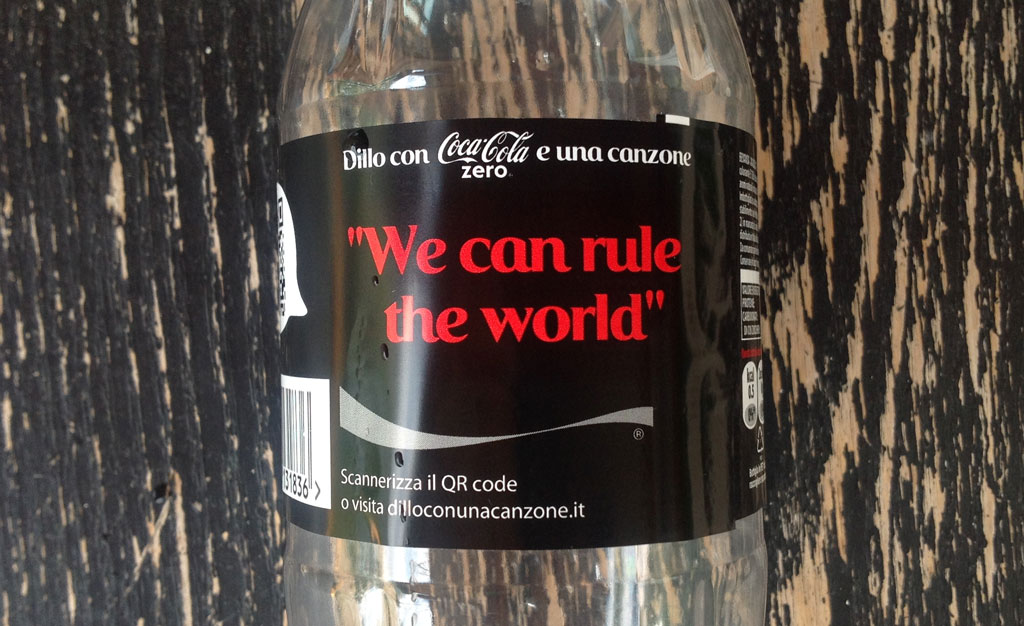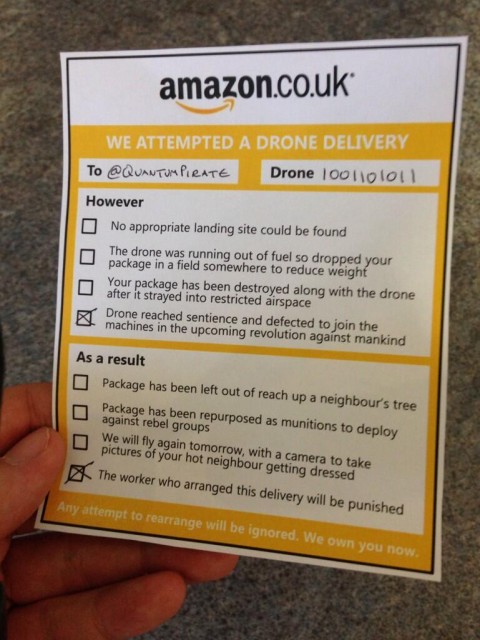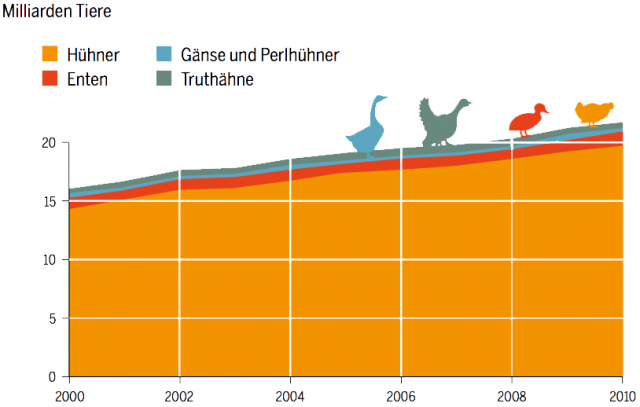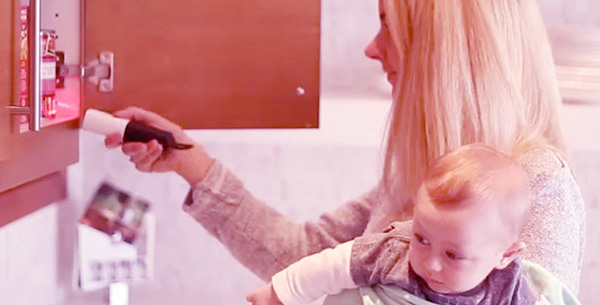Honesty on World Domination
Posted in Branding, Konsum, Unternehmen, Visuelle Kommunikation on August 12th, 2014 No Comments »

Posted in Branding, Konsum, Unternehmen, Visuelle Kommunikation on August 12th, 2014 No Comments »

Posted in artificial-intelligence, brave-new-black-mirror-matrix, De-Branding, Détournement, Humor / Satire, Konsum, Zukunft on July 17th, 2014 No Comments »
not only ordering will be more comfortable, also delivery. But things can get wrong, when machines get self-organized:

thanks Evy for sending the image by QuantumPirate, who provoked amazon with his funny fake.
Posted in Aufklärung / Information, Informations Design, Konsum, Magazin, Uncategorized, Visual Journalism, Visuelle Kommunikation on July 6th, 2014 No Comments »

Für eingefleischte Vegetarier nicht neues – gutes Futter, um sich bei Fleischfreunden beliebt zu machen:
Daten und Fakten über Tiere als Nahrungsmittel der Monde Diplomatique zum download als PDF.

Posted in dystopia, Gesellschaft, Konsum, Leben, Marketing on May 15th, 2014 No Comments »

Every member of the family can use Dash to easily add items to your AmazonFresh shopping list. Keep it on your kitchen counter or hang it on the refrigerator. Did your kids just eat the last of the cereal? Conveniently refill and restock your home’s everyday essentials, and have fun doing it.
… just stay home and everything you need arrives. Don’t waist time in the world outside. Another little step towards a brave new world matrix black mirror.
more on fresh.amazon.com/dash/
@Matteo: Thanks for the link!
Posted in Branding, Gesellschaft, Konsum, Revolution, Spiel on October 11th, 2013 No Comments »
Monopoly Empire = Brand Empire
With its new edition the classic capitalist game MONOPLOY finally became contemporary.
But it’s better than a parody. Monopoly Empire is the logical culmination of decades of Monopoly games that bear the name of eras, cities, and pop cultural icons. It’s not a bastardization of the series, it’s the series in its purest form, holding up a dark mirror to the muddled excesses of late capitalism. When everything is a brand, the most subversive thing of all is to lay out what you’re doing in its baldest form.
Monopoly Empire is a commentary on all the games that have come before it. It looks your Lord of the Rings special edition in the face and says “We’re not so different, you and I.” It forces you to confront the difference between a beloved cultural icon and a piece of marketing schlock.
The Batman edition? Just a brand. Marvel? Just a brand. The NFL? Just a brand. Star Wars? Just a brand.
Adi Robertson on the verge
A parody of capitalism cannot be more krass than capatilism itself, but parodies of communism can. Just listen to the communist Känguru and Marc-Uwe Kling playing MONOPOLY in a way that meets the logic of Communism. Really funny! (in “Die Känguru-Chroniken” by Marc-Uwe Kling). Benedikt Sarreiter writes on SZ-online that the original idea of MONOPOLY was to criticize capitalism. This comes as a surprise, i guess not only for me. It seems to be another proof that it is impossible to make a parody or satire of capitalism. Critic of capitalism has to be serious it seems, as if for a satirist it might be impossible to take capitalism of over the top. Capitalism is doing this on a daily basis, without any parodistic intentions.
But citic of capitalism at least can be entertaining, moving and (unintentionally) funny, like one of my favorites: Slavoj Žižek talking within an Occupy Wallstreet Session (thanks to Daniela for the link).
Posted in Aufklärung / Information, Buch, Gesellschaft, Gruppierung / Organisation, Konsum, Kultur, Kunst, Leben, Wirtschaft, Zukunft on September 22nd, 2013 No Comments »
provides and creates tools for a consciuos designing of our future which will be particularly challenging, and demanding creative processes beyond familiar dimensions.
It is about desiging the space between people: the political, social, artistic, scientific, economic,
philosophical, spiritual, practical space.
It is an artproject by people of various professional fields who like to work together in projects, grow in scale, scope and capacity through collaborative interdisciplinary work. Their common basis is an open
definition of creativity which does not exclude any field of work. These collectives share, at their core, an
idea and a belief that creativity is our single most valuable resource. The only resource providing
solutions for the dramatic global chaos we face.
Art is critique on a mechanistic way of thinking.
found on utopiatoolbox.org
They just published a UTOPIA TOOLBOX book [mainly in German language]. You can take a look over there.
via designdisaster.unibz.it
Posted in Gesellschaft, Konsum, www on April 1st, 2013 No Comments »
“Scheisse” liefert keinen Geruch.
Irgendwie kann ich mich des Eindrucks nicht erwehren, dass der neue Google-Service “Suchen und Schnuppern” ein Fake ist (na, klar, es ist erster April!). Ich befürchte aber im Grunde ist alles ist echt und ernst gemeint. Demnächst dann “Suchen und Fühlen”, “Suchen und Schmecken”, … willkommen in der Matrix.
@ Matteo: thanks for the link (via email)
[Edit, 2.4.: ein Aprilscherz, für wahr – dieser zeigt aber dennoch wo’s lang geht]
Posted in Aufklärung / Information, Journalismus, Konsum, Magazin, Nachrichten, Visual Journalism, Visuelle Kommunikation, Zeitung on January 25th, 2013 No Comments »
Der “Fleischatlas”, herausgegeben von der Heinrich-Böll-Stiftung, Le Monde Diplomatique und dem Bund für Umwelt und Naturschutz Deutschland (BUND) zeigt in Texten und Grafiken die globalen Zusammenhänge der Fleischerzeugung. Daten und Fakten sprechen für sich bzw. gegen Fleischkonsum und der damit zusammenhängende Ausbeutung. Die komplette Publikation als PDF.
Der Fleischatlas 2013 erzeugt ein Medienecho: Die Tageschau berichtet, ein Hörbeitrag fasst einiges Zusammen, was wir schon lange Wissen und spätestens seit We Feed the World gesehen haben oder weniger berühmte Filmchen, die viel Zeug in Zusammenhang bringen. Doch für Einige ist es immer noch eine Überraschung, dass “deutsche Schweine den Regenwald bedrohen” oder der Export von Hühnerflügeln afrikanisch Märkte und Landwirte kaputt macht. Es berichten so unterschiedliche Blätter wie die FR mit “Verhängnisvolle Vorliebe für Fleisch“, telepolis mit “Die Gier ist stärker als der Zweifel” und die WIWO mit einer Bildstrecke zu “Fünf Fakten aus dem Fleischatlas 2013“, die dort anfängt, wo alles endet, in der Wurst.

Auch Würstel sind aus Fleisch und Fleisch sind tote Tiere, die während sie bis zum gewaltsamen Tod ihr Dasein in einem Schweine-KZ fristen und dabei Kraftfutter fressen, für dessen Produktion der Regenwald geholzt wird und eine Menge Menschen ausgebeutet werden.
Posted in Film / Video, Gesellschaft, Konsum, Medien, Motion Graphics, Umwelt, Visual Journalism, Wirtschaft on April 26th, 2010 No Comments »
So kompakt wurden die globalen Zusammenhänge rund um Konsum selten auf den Punkt gebracht:
Auf der Site von The Story of Stuff gibt’s noch viel mehr Zeug zum Thema, seit neuestem auch ein gleichnamiges Buch.
Nicht ganz so umfassend und ‘punchy” ist der “Der Klimafilm” “Unsere Kleine Welt” von drei Kommunikationdesignstudenten der FH-Augsburg – dafür schräger und in jedem Fall ein informatives Vergnügen:
Posted in De-Branding, Film / Video, Konsum, Umwelt, Uncategorized, Visual Journalism on September 9th, 2009 No Comments »
Kunststoffe können bis zu 500 Jahre in Böden und Gewässern überdauern und mit ihren unbekannten Zusatzstoffen unser Hormonsystem schädigen. Wussten Sie, dass Sie Plastik im Blut haben?
Regisseur Werner Boote zeigt in seinem investigativen Kinodokumentarfilm, dass Plastik zu einer globalen Bedrohung geworden ist. Er stellt Fragen, die uns alle angehen: Warum ändern wir unser Konsumverhalten nicht? Warum reagiert die Industrie nicht auf die Gefahren? Wer ist verantwortlich für die Müllberge in Wüsten und Meeren? Wer gewinnt dabei? Und wer verliert?
Das ist ernst und hört sich auch so an. Der Film enthält aber auch einige sehr witzige Szenen, die das Absurde unsres Planet Plastic rüberbringen.